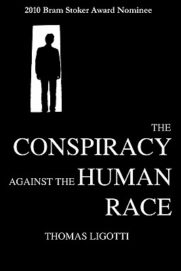 Thomas Ligotti
Thomas Ligotti
Hippocampus Press ($25)
by Matthew McGuire
In horror fiction there is the trope of the forbidden book containing secret knowledge that causes the reader to go mad. Wouldn’t such a tome be grand? Imagine writing something so profound, so true that the reader could never return to reality. Who could write such a thing?
The Conspiracy Against the Human Race is an amalgamation of philosophy, literature, and scientific research relating to pessimism. Its author, horror auteur Thomas Ligotti, has spent the majority of his career in obscurity due to his refreshing lack of self-promotion and his inconsistent publishing. His fiction occupies a niche within the horror genre, a heavily stylized supernaturalism that evokes European writers like Thomas Bernhard and Stefan Grabinski.
Conspiracy is Ligotti’s only book of non-fiction in a small but outstanding body of work. It is a long essay collecting various artifacts of pessimistic philosophy and literature, from Sweeney Todd to Peter Wessel Zapffe. His central thesis can be boiled down to “1) there is nothing to do; 2) there is nowhere to go; 3) there is nothing to be; 4) there is no one to know.” Human existence is an uncanny puppet show played to an empty theater. We dare not look to the dark, idiot force that animates us, instead choosing to believe in the vast web of conspiracy of purpose and optimism, from the undying belief that our situation can always get better to the unspoken assumption of a “self.”
The book does not unfold as a narrative; the philosophical fragments that pepper the text function more as diary entries, confessions of those who do not find life to be alright. Accompanying them are abstractions, fables, and epigraphs that are a testament to Ligotti’s imagination as a writer: “With eyes that see through a translucent veil shimmering before us, we look at life from the other side. There, something escorts us through our days and nights like a second shadow that casts itself into another world and fastens us to it.” These little beauties put forth no argument, advance no doctrine, solicit no response. Rather, they immerse us in the atmosphere of a dream that slowly sours. Existence becomes a hackneyed horror film where dialogue is imposed on rapidly moving lips, the plot moves towards no meaningful ending, and an array of latex monsters whose mouths stretch with the pose of overly-enthusiastic laughter terrorize us. Everything we do or say, everyone we have ever met or loved, everywhere we have ever been is, in Ligotti’s phrase, “MALIGNANTLY USELESS.”
The trouble with pessimism as a comprehensive worldview is that it negates everything, even itself. In a pessimistic universe, there is no reason to subscribe to positivity or negativity, as both positions are equally meaningless in the eternal scheme. Ligotti openly admits this fault, saying “It’s all a matter of personal pathology. Put more simply, pessimism can never compel us to action, it can never ask us to do or believe in anything because pessimism denies that there is an “us” that “does” or an “anything” in which to believe.
Because there is no gospel of pessimism, The Conspiracy Against the Human Race is certainly not an evangelical text, but it does provide supreme catharsis to the already converted. Indeed, the knowledge that there are others who feel similar to yourself is the one bulwark against the crushing meaninglessness of existence.
